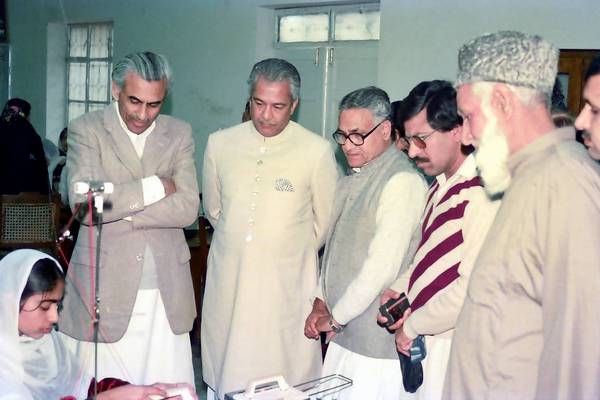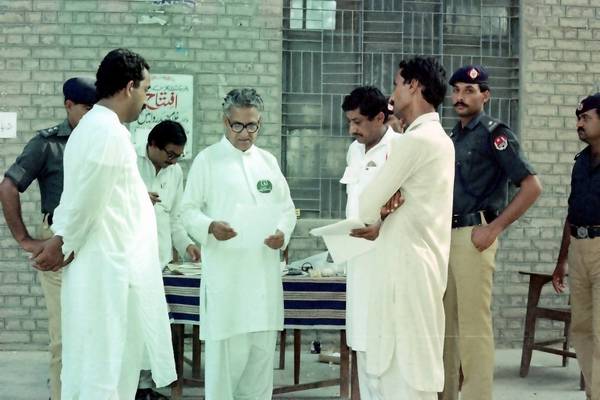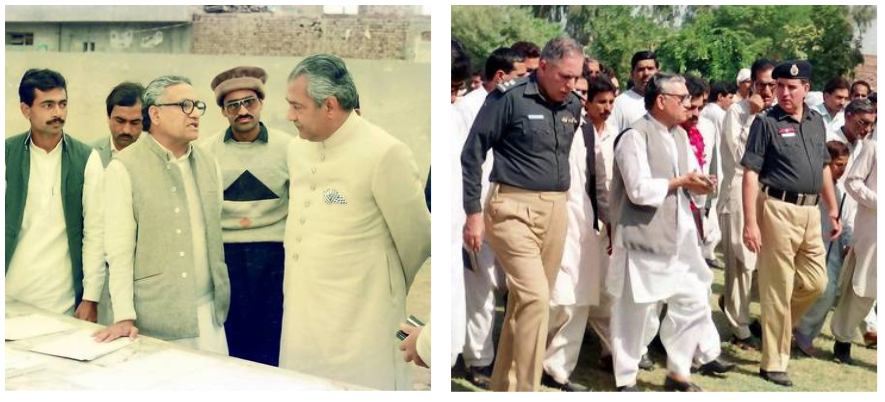Ghulam Haider Wyne is a name etched in the annals of Pakistani politics. His journey was marked by dedication to public service, adherence to merit, and an unwavering commitment to democracy. Despite his humble beginnings, he went on to give a stellar performance as chief minister of Punjab, Pakistan’s biggest province.

Ghulam Haider Wyne was born on 1 January 1940 in Amritsar, British India. After the independence of Pakistan in 1947, his family migrated to and settled in Mian Channu, some 250 km southwest of Lahore in Punjab. He got his early education from Amritsar but could not get higher education due to financial constraints. He worked as a labourer in a flour mill (aatay ki chakki) belonging to his father-in-law, while also working as a typist at a private firm in Mian Channu. He carried out social work along with his job and soon became well-known in his small town.
Ghulam Haider Wyne was a passionate advocate for education. His unfulfilled dream of attaining higher education ignited a burning passion within him. He meticulously preserved old editions of the renowned newspaper Nawa-i-Waqt from the time of the freedom struggle, safeguarding them in an old metal box that he transported from Amritsar to Pakistan. He was known for his extensive and voracious reading habits.
He is credited with training his party’s politicians. He not only mentored young party leaders but also imparted the intricacies of grassroots politics to even established figures and seasoned politicians.
Along with social work, Ghulam Haider Wyne engaged in grassroots politics. Due to his integrity, he became popular among the people and was subsequently elected as a Basic Democracy member in 1961 during the era of General Ayub Khan. He performed exceptionally well during his tenure and the people of his city later elected him as vice chairman of the Municipal Committee for five years.
In the 1970 elections, he formed an election alliance, gathering all the segments of Muslim Leagues under one platform. After the elections, he became a notable opposition leader and a prominent critic of government policies. In response, local authorities registered fabricated cases of theft and he was often arrested under Section 16 of the Maintenance of Public Order Ordinance. This could not break him or his bond with his people. During the 1977 elections, he contested as a candidate of Pakistan National Alliance and secured 49,197 votes against 63,699 of the winning candidate. This was his first and only defeat in electoral politics.
 He later became a member of Majlis-e-Shoora in the Zia era. In the 1985 non-partisan elections, he was elected as a member of the Punjab Assembly. He was appointed as minister of industry, minerals, and planning by the then chief minister of Punjab Mian Muhammad Nawaz Sharif. He also served as education minister for some time.
He later became a member of Majlis-e-Shoora in the Zia era. In the 1985 non-partisan elections, he was elected as a member of the Punjab Assembly. He was appointed as minister of industry, minerals, and planning by the then chief minister of Punjab Mian Muhammad Nawaz Sharif. He also served as education minister for some time.
In 1988, Ghulam Haider Wyne won his National Assembly seat from the platform of Islami Jamhoori Ittehad (IJI). This electoral victory marked the beginning of his illustrious parliamentary career. Due to his political standing which had garnered the trust and respect of both his constituents and fellow politicians, he was elected as the opposition leader in the National Assembly. However, he later voluntarily relinquished his seat in favour of Ghulam Mustafa Jatoi at the party’s request in 1989.
After the dismissal of the PPP government in 1990, he was nominated as the caretaker chief minister of Punjab. He won a provincial seat in the 1990 elections and was elected leader of the house in the Punjab Assembly on 8 November 1990, with an overwhelming vote of 201 against his People’s Democratic Alliance rival Rana Ikram Rabbani who polled only eight votes. It was the high point of his long and arduous journey in politics when he was unanimously elected as president of PML Punjab. The only office that remained to be occupied by him was that of the prime minister.
He is remembered as Sir Syed Ahmed Khan of Mian Channu after his death because he had set up over 18 educational institutions in his hometown.
As a parliamentarian, he actively participated in the legislative process. He championed various causes and worked tirelessly on issues affecting his constituency and the nation. His contributions ranged from advocating for improved education and healthcare facilities to supporting policies that aimed to boost economic development in his region. His tenure is remembered as one of the best tenures for the workers and general public with their direct access to the chief minister. He was always available for them in his office or at the residence.
He is remembered as Sir Syed Ahmed Khan of Mian Channu after his death because he had set up over 18 educational institutions in his hometown. He spearheaded the establishment of the Punjab Education Foundation in 1991 and allocated a fund of Rs 500 million for the foundation. He was also the founder and first chairman of Nazaria-i-Pakistan Trust.
 He was labelled as a troublemaker by his rival political leaders because, possessing an intricate knowledge of the entire political system, he never allowed them to escape their errors. His unwavering commitment to rules and regulations led him to make decisions strictly following established norms and guidelines. In a country where nepotism and favouritism often overshadow merit, he pioneered and steadfastly upheld a policy that emphasised meritocracy, ensuring that every individual earned their position through adherence to established rules and procedures.
He was labelled as a troublemaker by his rival political leaders because, possessing an intricate knowledge of the entire political system, he never allowed them to escape their errors. His unwavering commitment to rules and regulations led him to make decisions strictly following established norms and guidelines. In a country where nepotism and favouritism often overshadow merit, he pioneered and steadfastly upheld a policy that emphasised meritocracy, ensuring that every individual earned their position through adherence to established rules and procedures.
His tenure as chief minister was remarkable in several ways. He delegated authority to his ministers while emphasising the importance of adhering to merit. To uphold the merit-based policy to its fullest extent, he even took action against the wife of a former provincial law minister who was implicated in a cooperative scam. It’s worth noting that this minister was one of the four IJI members who had nominated Wyne for the position of CM.
He is credited with training his party’s politicians. He not only mentored young party leaders but also imparted the intricacies of grassroots politics to even established figures and seasoned politicians. During his time as president of PML Punjab, the party’s membership rose exponentially and the party became a strong institution.
 Ghulam Haider Wyne remained the chief minister of Punjab till 25 April 1993. He showed a complete disregard for his safety and security. He never availed himself of official security and protocol, both during his time in office and afterwards. Whenever someone suggested the need for security, he would simply respond that no reasonable person would pose a threat to him. Tragically, during the election campaign in 1993, while he was travelling to canvass support, he was attacked and lost his life on 29 September near Basti Nusratpur.
Ghulam Haider Wyne remained the chief minister of Punjab till 25 April 1993. He showed a complete disregard for his safety and security. He never availed himself of official security and protocol, both during his time in office and afterwards. Whenever someone suggested the need for security, he would simply respond that no reasonable person would pose a threat to him. Tragically, during the election campaign in 1993, while he was travelling to canvass support, he was attacked and lost his life on 29 September near Basti Nusratpur.
Ghulam Haider Wyne’s sudden demise was a great loss to Pakistan’s political landscape.After his martyrdom, his wif e Begum Majeeda Wyne continued in the footsteps of her husband and served the party and the people as a member of the National Assembly and as party leader.
In remembrance of his contributions, several development projects and institutions have been named in his honour in the Multan region. These serve as a testament to the enduring legacy of a leader who worked tirelessly for the welfare of his people.

In a world often characterised by political turbulence, Ghulam Haider Wyne’s story is a reminder that leaders who prioritise the needs of their constituents and uphold democratic values can leave an enduring legacy of positive change.
On hearing the news of the demise of Ghulam Haider Wyne, Mian Muhammad Nawaz Sharif was clearly disturbed. He cried and said, “No true Pakistani can assassinate a person like Ghulam Haider Wyne. Ghulam Haider Wyne was a true and loyal Pakistani and pioneer of politics of decency.”
The writer is a democrat and constitutionalist, with a keen interest in local & global politics. His X handle is @ThePreCambrian.








